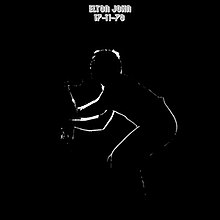11-17-70
| 17-11-70 | ||||
|---|---|---|---|---|
 |
||||
| Live album by Elton John | ||||
| Released | 9 April 1971 | |||
| Recorded | 17 November 1970 | |||
| Venue | A&R Recording Studios, New York, NY, for a live radio broadcast on WABC-FM (later WPLJ) | |||
| Genre | Rock | |||
| Length | 48:25 | |||
| Label |
Uni (US) DJM (UK) |
|||
| Producer | Gus Dudgeon | |||
| Elton John chronology | ||||
|
||||
| Professional ratings | |
|---|---|
| Review scores | |
| Source | Rating |
| AllMusic | |
| Rolling Stone | (not rated) |
17-11-70 (US title 11-17-70), released in 1971, is the fifth official album release for Elton John, and his first live album.
The recording was taken from a live radio broadcast on 17 November 1970, hence the album's title. According to John, a live album was never planned as a release. Recordings of the broadcast, however, were popular among bootleggers which, according to John's producer, Gus Dudgeon, eventually prompted the record label to release it as an album. It has been said that the release by an eastern bootlegger of the whole 60-minute air cast rather than the 48 minutes selected by Dick James Music significantly cut into the US sales of the live album. However, the entire concert was an 80-minute affair, and double-LPs containing the entire concert were more common than those containing only 60 minutes. Another contributing factor to the original album's soft sales could have been the glut of Elton John product on the market at the time. John also had in release 2 full studio albums (Elton John and Tumbleweed Connection) and a movie soundtrack (Friends) when the live LP was issued. Nonetheless, it became the fourth of John's records to simultaneously land in the Top 100, making him the first act to do so since The Beatles.
According to longtime NYC radio personality Dave Herman (who can be heard at the beginning and end of the album), Elton John cut his hand at some point during the performance, and by the end of the show, the piano keys were covered with blood.
John and his band performed 13 songs during the radio broadcast. The original album included only six of the songs; a seventh, "Amoreena," appeared as a bonus track on the album's 1996 CD reissue. The other six performances remained until 2017 officially unreleased: "I Need You to Turn To", "Your Song", "Country Comfort", "Border Song", "Indian Sunset" and "My Father's Gun".
John has stated in several interviews that he believes that this recording is his best live performance. He has also cited the album as a great showcase for the musicianship of drummer Nigel Olsson and bassist Dee Murray. It is also the only officially released example of what John's live band sounded like prior to the arrival of guitarist Davey Johnstone, who wouldn't be a member until the release of Honky Château in 1972.
...
Wikipedia
